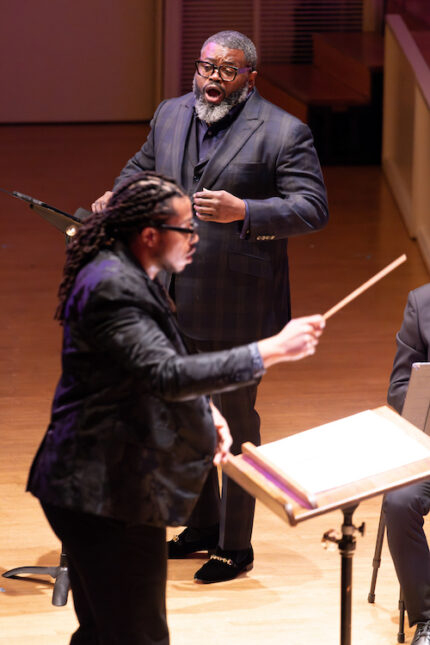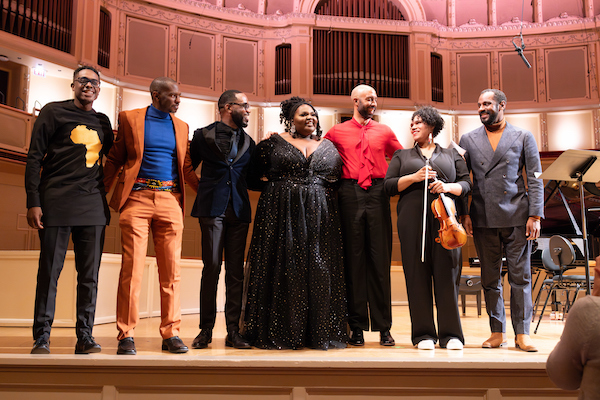Geter’s passionate song cycle stands out amid tepid MusicNOW opener

“We’re in for a really big ride,” an enthusiastic Jessie Montgomery, the program curator and host of the opening concert of MusicNOW’s 2023-24 season, told the packed audience Sunday afternoon at Symphony Center.
Not to sound too Grinch-like at this holiday season, one might charitably call it a mild ride.
If lofty intentions were all, the agenda of instrumental and vocal chamber works put together by the composer and violinist, who was beginning her final season of a three-year appointment as the Chicago Symphony Orchestra’s Mead composer-in-residence, might have been deemed an artistic triumph. Certainly the audience greeted everything as such.
But, for the most part, this debut performance by the collective of young African-American composers calling themselves the Blacknificent 7 (Montgomery is an active member of the group) turned up little that truly pushed the stylistic envelope in any truly arresting or distinctive way, beyond the blandly amiable bar Montgomery has set for the series under her watch.
At least the performances by CSO musicians and guest performers, appearing in various ensemble formations, were sufficiently polished and expert to satisfy the composers, who took a beaming bow en masse at the end of the short program, to hearty applause and cheers.
The Blacknificent 7 came together as a group of composers during the Covid-19 pandemic, Montgomery explained, via a series of Zoom meetings in which they shared experiences, frustrations, hopes and, not incidentally, mutual support. If by banding together in this manner they can gain wider exposure for their creations than would be possible through individual promotion, then more power to them.
Montgomery wasn’t the only hyphenated musician on stage –composer-performers Damien Geter and Jasmine Barnes also got to display their versatility in their own works and pieces by their colleagues.
The work that came off most successfully was Geter’s Annunciations (2022), a song cycle of seven vignettes derived from an explicitly homoerotic text by Joshua Banbury, subtitled “Visions from a Fever Dream.” Each vignette is a love song from a night of passion between male lovers, one the singer-narrator, the other a mysterious, divine being “sung” throughout the cycle by solo cello, here the ever-mesmerizing CSO cellist Katinka Kleijn.
“Into my room he reascends . . . and it begins all at once like a fever dream he comes in to engender me,” reads the poem. Passions soon overtake text and music, the explicit carnality of Geter’s lyrical declamation buoyed by ecstatic instrumental lines (“Now on midnight skin lies the golden chain again lapped round his sweaty nape”). Voice and cello symbolically merge in Vision Five, with the narrator singing the words of his partner, as if in a reverie.
The cycle was written for the splendid American tenor Russell Thomas, a singer well-known to Lyric Opera audiences for his recent performances of Verdi (Ernani, Il Trovatore) and Puccini (Tosca.) He negotiated the vocal surges and swells with a rich and powerful instrument capable of affecting expressivity and softer timbral shadings whenever the texts turned tender. He laid bare the landscape of the heart indelibly, with equally committed backing from an ensemble of harp and string quintet under the direction of Donald Lee III.

Geter’s firm bass-baritone was put to most effective use as one of two vocalists in Jasmine Barnes’ The United States Welcomes You (2023), a kind of mini-opera in a single scene, with the composer herself taking the second vocal part. Barnes, with her distorted quotations of such patriotic Americana as Stars and Stripes Forever, adds layers of parody to the text by former U.S. poet laureate Tracy K. Smith, a series of increasingly insulting—also outrageously racist— interrogations posed by (hypothetical?) immigration authorities to new arrivals: “What do you see that you may wish to steal? Why do your dark bodies Drink up all the light?”
The score is such a grab-bag of pop, gospel and other vernacular musical references, within a classical context, that it was tough to discern any particular individuality in Barnes’ musical grammar. To be sure, both singers acquitted themselves wonderfully well, as did the ensemble of flute, piano and four strings, again ably coordinated by Donald Lee III.
Barnes’ talent shone through more effectively in her riveting rendition of Dave Ragland’s song “I Believe” (2017). The text is a translation of a brief and simple declaration of faith found on a wall of the Auschwitz concentration camp. A modern spiritual likely to become a classic, it was done with moving sincerity and sweet, shining top notes—atop a rich middle and lower range—by the remarkable soprano. A standing ovation was her reward.
The slow, elegiac strains of Ragland’s Eight Tones for Elijah (2020), commemorating a young black violinist killed by police on his walk home, was preceded by two instrumental pieces, the Chicago-based composer Shawn Okpebholo’s CryptOlogiE (2014) and Joel Thompson’s string quartet In Response to Madness (2019).
In the main, the former piece pulses with fields of twitchy, sharply accented rhythmic activity based on tone rows derived from the numbers of the birthdays of the composer’s wife and two daughters. For no apparent reason, prepared-piano effects are thrown in (ho hum). Pleasant stuff, and neatly played, the piece left pretty much the same rather anonymous impression as Thompson’s musical answer to what he terms contemporary “political mayhem, massacres, climate” and “our seemingly futile attempts to make things better.” Brusque staccato gestures giving way to saccharine harmonic resolutions, crisply dispatched by a quartet of top CSO string players, made for a curiously mild rejoinder to devastating societal ills.
Strategically placed throughout the program were three brief improvisations by Montgomery on violin and the multi-faceted Carlos Simon on piano. At once charming, colorful and exotic, the pieces went down nicely.
One notes with alarm the cutback on stand-alone MusicNOW concerts this season. No explanation from management.
Dates for the remaining MusicNOW concerts in the 2023-24 season at Symphony Center are March 3, June 1 and June 15. The June concerts are to include new Montgomery works performed by the Chicago Symphony Orchestra. cso.org
Posted in Performances




